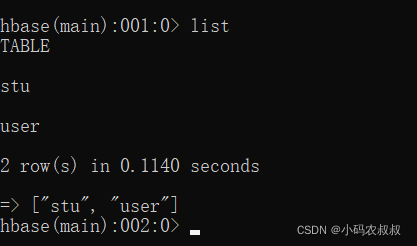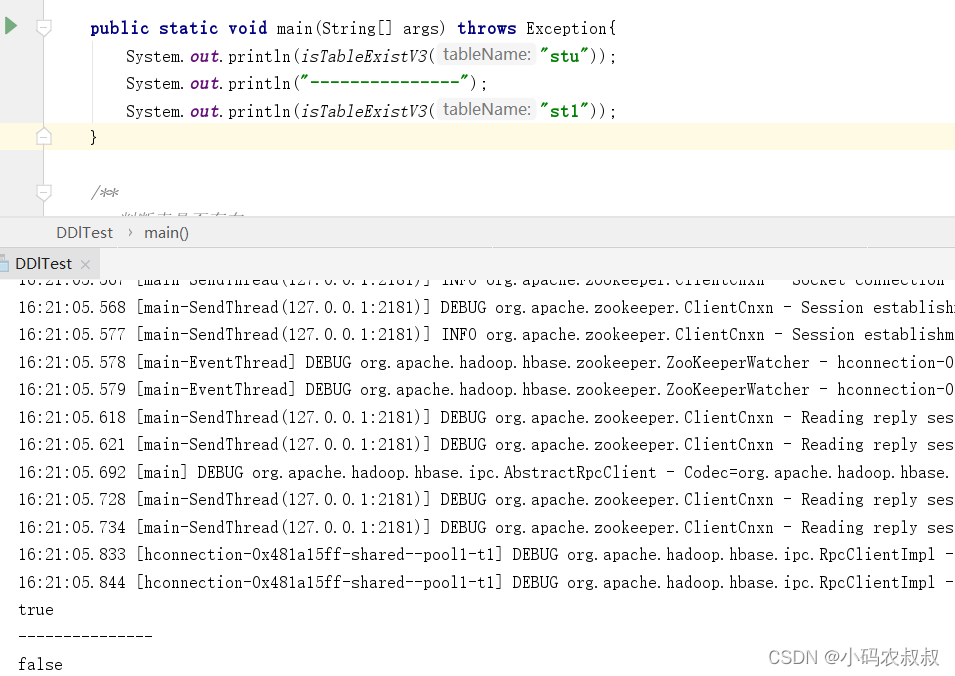作为大数据家族中的重要一员,在大数据以及海量数据存储方面,hbase具有重要的地方,本篇将从java对hbase的操作上,进行详细的说明;
HBase 是一种分布式、可扩展、支持海量数据存储的 NoSQL 数据库;
从逻辑上来说,HBase 数据模型同关系型数据库很类似,数据存储在一张表中,有行有列。但从 HBase 的底层物理存储结构(K-V)来看,HBase 更像是一个 multi-dimensional map;


vue springboot整合,hbase中有几个重要的与数据模型相关的术语,有必要做深入的了解;
1、Name Space
2、Region
因此,和关系型数据库相比,HBase 能够轻松应对字段变更的场景
3、Row
HBase 表中的每行数据都由一个 RowKey 和多个 Column(列)组成,数据是按照 RowKey的字典序存储,且查询数据时只能根据 RowKey 进行检索,所以RowKey 的设计十分重要;
docker hbase?4、Column
5、Time Stamp
6、Cell
在小编之前的某一篇中,分享了基于centos7环境搭建hbase的单机运行环境,本篇为方便演示,在windows下快速搭建一个hbase的运行环境;
1、官网下载安装包;
hadoop 3.1.0 以及 hbase 1.3.1
springboot整合。

2、配置hadoop环境变量

并加入到系统path中,

3、修改 hbase-env.cmd配置文件
进入hbase解压后的onfig目录下,在 hbase-env.cmd 添加如下的配置,即设置hbase依赖的Java环境以及自身的配置目录;
set HBASE_MANAGES_ZK=false
set JAVA_HOME=C:\Program Files\Java\jdk1.8.0_171
set HBASE_CLASSPATH=E:\bigData-tool\hbase-1.3.1\conf
4、修改hbase-site.xml 文件
springboot版本。进入hbase解压后的onfig目录下,将下面的配置文件添加到hbase-site.xml 配置中
<configuration><property> <name>hbase.rootdir</name> <value>file:///E:/bigData-tool/hbase-1.3.1/root</value> </property> <property> <name>hbase.tmp.dir</name> <value>E:/bigData-tool/hbase-1.3.1/tem</value> </property> <property> <name>hbase.zookeeper.quorum</name> <value>127.0.0.1</value> </property> <property> <name>hbase.zookeeper.property.dataDir</name> <value>E:/bigData-tool/hbase-1.3.1/zoo</value> </property> <property> <name>hbase.cluster.distributed</name> <value>false</value> </property>
</configuration>
5、启动hbase服务
进入bin目录下,在cmd窗口中执行下面的启动脚本启动


启动成功后,可以通过浏览器控制台查看hbase服务信息

6、hbase客户端测试
服务启动之后,在bin目录下,通过hbase提供的shell客户端操作命令测试下服务,进入bin目录下,直接cmd输入 hbase shell 即可
hbase搭建?
输入 list命令,查看下当前所有的表

到此为主,所有的准备工作就完成了,下面让我们通过hbase提供的Java客户端SDK来看看如何操作habse数据库吧;
1、导入客户端依赖
<dependency><groupId>org.apache.hbase</groupId><artifactId>hbase-client</artifactId><version>1.3.1</version></dependency><dependency><groupId>org.apache.hbase</groupId><artifactId>hbase</artifactId><version>1.3.1</version></dependency>
2、DDL相关操作
和ddl相关的包括,判断表是否存在,创建表,创建命名空间,删除表,删除命名空间;
import org.apache.hadoop.conf.Configuration;
import org.apache.hadoop.hbase.*;
import org.apache.hadoop.hbase.client.Admin;
import org.apache.hadoop.hbase.client.Connection;
import org.apache.hadoop.hbase.client.ConnectionFactory;
import org.apache.hadoop.hbase.client.HBaseAdmin;import java.io.IOException;public class DDlTest {public static Connection connection = null;public static Admin admin = null;static {Configuration conf = HBaseConfiguration.create();//使用 HBaseConfiguration 的单例方法实例化conf = HBaseConfiguration.create();conf.set("hbase.zookeeper.quorum", "127.0.0.1");conf.set("hbase.zookeeper.property.clientPort", "2181");try {connection = ConnectionFactory.createConnection(conf);admin = connection.getAdmin();} catch (IOException e) {e.printStackTrace();}}public static void main(String[] args) {}/*** 判断表是否存在* @param tableName* @return* @throws Exception*/public static boolean isTableExistV1(String tableName) throws Exception {HBaseConfiguration conf = new HBaseConfiguration();conf.set("hbase.zookeeper.quorum", "127.0.0.1");conf.set("hbase.zookeeper.property.clientPort", "2181");HBaseAdmin admin = new HBaseAdmin(conf);boolean tableExists = admin.tableExists(tableName);admin.close();return tableExists;}/*** 判断表是否存在* @param tableName* @return* @throws Exception*/public static boolean isTableExistV2(String tableName) throws Exception {Configuration conf = HBaseConfiguration.create();conf.set("hbase.zookeeper.quorum", "127.0.0.1");conf.set("hbase.zookeeper.property.clientPort", "2181");Connection connection = ConnectionFactory.createConnection(conf);Admin admin = connection.getAdmin();boolean result = admin.tableExists(TableName.valueOf(tableName));admin.close();return result;}public static boolean isTableExistV3(String tableName) throws Exception {boolean result = admin.tableExists(TableName.valueOf(tableName));return result;}/*** 创建表* @param tableName 表名* @param columnFamily 列簇名* @throws Exception*/public static void createTable(String tableName, String... columnFamily) throws Exception {if (columnFamily.length <= 0) {System.out.println("请传入列簇信息");}//判断表是否存在if (isTableExistV3(tableName)) {System.out.println("表" + tableName + "已存在");close();return;}//创建表属性对象,表名需要转字节HTableDescriptor descriptor = new HTableDescriptor(TableName.valueOf(tableName));//创建多个列族for (String cf : columnFamily) {descriptor.addFamily(new HColumnDescriptor(cf));}//根据对表的配置,创建表admin.createTable(descriptor);System.out.println("表" + tableName + "创建成功!");close();}/*** 删除表* @param tableName*/public static void dropTable(String tableName) throws Exception{if (!isTableExistV3(tableName)) {System.out.println(tableName + ": 不存在 !" );return;}//1、下线表admin.disableTable(TableName.valueOf(tableName));//2、删除表admin.deleteTable(TableName.valueOf(tableName));System.out.println("删除表成功");close();}/*** 创建命名空间* @param nameSpace*/public static void createNameSpace(String nameSpace){if(nameSpace == null){System.out.println(nameSpace + ": 不存在 !" );return;}NamespaceDescriptor namespaceDescriptor = NamespaceDescriptor.create(nameSpace).build();try {admin.createNamespace(namespaceDescriptor);} catch (NamespaceExistException e){System.out.println("命名空间已存在");}catch (IOException e) {e.printStackTrace();}System.out.println(nameSpace + ": 命名空间创建成功");}public static void close() {if (admin != null) {try {admin.close();} catch (IOException e) {e.printStackTrace();}}if (connection != null) {try {connection.close();} catch (IOException e) {e.printStackTrace();}}}
}Spring Boot。我们选取其中一个判断表是否存在的方法做一下测试,观察控制台输出结果,其他的方法有兴趣的同学可以依次做测试即可;

3、DML相关操作
和DML操作相关的主要包括表数据的增删改查,相对来说,在实际开发中,DML的操作,尤其是数据查询,可能使用的更加频繁,因此关于DML的操作务必要掌握;
package com.congge.test;import org.apache.commons.lang.StringUtils;
import org.apache.hadoop.conf.Configuration;
import org.apache.hadoop.hbase.Cell;
import org.apache.hadoop.hbase.CellUtil;
import org.apache.hadoop.hbase.HBaseConfiguration;
import org.apache.hadoop.hbase.TableName;
import org.apache.hadoop.hbase.client.*;
import org.apache.hadoop.hbase.util.Bytes;import java.io.IOException;public class DMLTest {public static Connection connection = null;public static Admin admin = null;static {Configuration conf = HBaseConfiguration.create();//使用 HBaseConfiguration 的单例方法实例化conf = HBaseConfiguration.create();conf.set("hbase.zookeeper.quorum", "127.0.0.1");conf.set("hbase.zookeeper.property.clientPort", "2181");try {connection = ConnectionFactory.createConnection(conf);admin = connection.getAdmin();} catch (IOException e) {e.printStackTrace();}}public static void main(String[] args) throws Exception {//System.out.println(isTableExistV1("user"));//System.out.println(isTableExistV3("user"));//createTable("stu","info1","info2");//给表put数据//putData("stu","1005","info1","name","wangwu");//putData("stu","1003","info1","name","q7");//获取表数据//System.out.println("----------");//getData("stu","1005","","");//获取数据【scan的方式】//getDataFromScan("stu");//dropTable("stu");//createNameSpace("0409");deleteData("stu","1005","","");close();}public static boolean isTableExistV3(String tableName) throws Exception {boolean result = admin.tableExists(TableName.valueOf(tableName));return result;}/**** @param tableName 表名* @param rowKey rowKey* @param cf columnFamily* @param cn columnName* @param value columnValue*/public static void putData(String tableName,String rowKey,String cf,String cn,String value) throws Exception{//1、获取表对象Table table = connection.getTable(TableName.valueOf(tableName));//2、拼接 put对象Put put = new Put(Bytes.toBytes(rowKey));//3、添加 字段信息 columnput.addColumn(Bytes.toBytes(cf),Bytes.toBytes(cn),Bytes.toBytes(value));//4、执行数据插入table.put(put);System.out.println("数据插入成功");}/*** 获取数据* @param tableName* @param rowKey* @param cf* @param cn*/public static void getData(String tableName,String rowKey,String cf,String cn) throws Exception{Table table = connection.getTable(TableName.valueOf(tableName));Get get = new Get(Bytes.toBytes(rowKey));//添加 cf【也可以不添加】//get.addFamily(Bytes.toBytes(cf));// 同时传入 cf 和 cnif(StringUtils.isNotEmpty(cf) && StringUtils.isNotEmpty(cn)){get.addColumn(Bytes.toBytes(cf),Bytes.toBytes(cn));}Result result = table.get(get);//解析结果Cell[] cells = result.rawCells();for(Cell cell : cells){System.out.println("cf : " + Bytes.toString(CellUtil.cloneFamily(cell)));System.out.println("cn : " + Bytes.toString(CellUtil.cloneQualifier(cell)));System.out.println("value : " + Bytes.toString(CellUtil.cloneValue(cell)));}}/*** 通过扫描的方式获取数据* @param tableName*/public static void getDataFromScan(String tableName) throws Exception{Table table = connection.getTable(TableName.valueOf(tableName));//拿到扫描器对象//Scan scan = new Scan();//可以根据 rowkey继续获取【非必须】Scan scan = new Scan(Bytes.toBytes("1001"),Bytes.toBytes("1003"));ResultScanner resultScanner = table.getScanner(scan);//结果解析for(Result result : resultScanner){Cell[] cells = result.rawCells();for(Cell cell : cells){System.out.println("rowkey : " + Bytes.toString(CellUtil.cloneRow(cell)));System.out.println("cf : " + Bytes.toString(CellUtil.cloneFamily(cell)));System.out.println("cn : " + Bytes.toString(CellUtil.cloneQualifier(cell)));System.out.println("value : " + Bytes.toString(CellUtil.cloneValue(cell)));}}}/*** 删除数据* @param tableName* @param rowKey* @param cf* @param cn* @throws Exception*/public static void deleteData(String tableName,String rowKey,String cf,String cn) throws Exception{Table table = connection.getTable(TableName.valueOf(tableName));Delete delete = new Delete(Bytes.toBytes(rowKey));//还可以传入列簇,以及字段名【非必须】if(StringUtils.isNotEmpty(cf) && StringUtils.isNotEmpty(cn)){delete.addColumn(Bytes.toBytes(cf),Bytes.toBytes(cn));}table.delete(delete);System.out.println("数据删除成功");}public static void close() {if (admin != null) {try {admin.close();} catch (IOException e) {e.printStackTrace();}}if (connection != null) {try {connection.close();} catch (IOException e) {e.printStackTrace();}}}}
下面选择几个方法做一下测试,观察下效果如何,
插入数据与查询数据
其中关于查询数据,其API很灵活,可以只传入 rowKey,也可以进一步传入 列簇以及指定字段名称查询;
hbase redis?
删除数据测试

更多的方法有兴趣的同学可以一一测试,限于篇幅,这里就不继续展开了;
下面演示下在web应用中,与springboot的整合过程
1、导入springboot依赖
<dependency><groupId>org.springframework.boot</groupId><artifactId>spring-boot-starter-web</artifactId></dependency>
spring boot jpa、2、添加一个工具类
使用该工具类,完成对hbase的一系列的增删查改
import org.apache.hadoop.conf.Configuration;
import org.apache.hadoop.hbase.Cell;
import org.apache.hadoop.hbase.CellUtil;
import org.apache.hadoop.hbase.TableName;
import org.apache.hadoop.hbase.client.*;
import org.apache.hadoop.hbase.util.Bytes;
import org.slf4j.Logger;
import org.slf4j.LoggerFactory;import java.io.IOException;
import java.util.HashMap;
import java.util.Map;public class HBaseService {private Logger log = LoggerFactory.getLogger(HBaseService.class);private Admin admin = null;private Connection connection = null;public HBaseService(Configuration conf) {try {connection = ConnectionFactory.createConnection(conf);admin = connection.getAdmin();} catch (IOException e) {log.error("获取HBase连接失败!");}}public Map<String,String> getData(String tableName,String rowKey,String cf,String cn) throws Exception{Map<String,String> resultMap = new HashMap<>();Table table = connection.getTable(TableName.valueOf(tableName));Get get = new Get(Bytes.toBytes(rowKey));//添加 cf【也可以不添加】//get.addFamily(Bytes.toBytes(cf));// 同时传入 cf 和 cn//get.addColumn(Bytes.toBytes(cf),Bytes.toBytes(cn));Result result = table.get(get);//解析结果Cell[] cells = result.rawCells();for(Cell cell : cells){String columnFamilyName = Bytes.toString(CellUtil.cloneFamily(cell));System.out.println("columnFamilyName : " + columnFamilyName);String colName = Bytes.toString(CellUtil.cloneQualifier(cell));System.out.println("colName : " + colName);String colValue = Bytes.toString(CellUtil.cloneValue(cell));System.out.println("colValue : " + colValue);resultMap.put(colName,colValue);}return resultMap;}}将该类添加到spring容器中,方便后续其他类注入
import com.congge.service.HBaseService;
import org.apache.hadoop.hbase.HBaseConfiguration;
import org.springframework.context.annotation.Bean;
import org.springframework.context.annotation.Configuration;@Configuration
public class HBaseConfig {@Beanpublic HBaseService getHbaseService() {//设置临时的hadoop环境变量,之后程序会去这个目录下的\bin目录下找winutils.exe工具,windows连接hadoop时会用到//System.setProperty("hadoop.home.dir", "D:\\Program Files\\Hadoop");//执行此步时,会去resources目录下找相应的配置文件,例如hbase-site.xmlorg.apache.hadoop.conf.Configuration conf = HBaseConfiguration.create();conf.set("hbase.zookeeper.quorum", "127.0.0.1");conf.set("hbase.zookeeper.property.clientPort", "2181");return new HBaseService(conf);}}
注意,在实际开发中,连接zk的信息可以通过外部配置文件读取进来;
3、编写一个测试使用的controller类
import com.congge.service.HBaseService;
import org.springframework.beans.factory.annotation.Autowired;
import org.springframework.web.bind.annotation.GetMapping;
import org.springframework.web.bind.annotation.RestController;import java.util.Map;@RestController
public class HbaseController {@Autowiredprivate HBaseService hBaseService;@GetMapping("/getData")public Map<String,String> getData(String tableName, String rowKey, String cf, String cn) throws Exception{return hBaseService.getData(tableName,rowKey,cf,cn);}}
在该类中,有一个获取单行数据的方法,启动工程,浏览器访问接口:
java连接hbase,http://localhost:8087/getData?tableName=stu&rowKey=1002

本篇详细总结了hbase的Java客户端的使用,在实际开发过程中,还需要结合自身的情况做更加细致的整合与优化,本篇到此结束,感谢观看!
版权声明:本站所有资料均为网友推荐收集整理而来,仅供学习和研究交流使用。

工作时间:8:00-18:00
客服电话
电子邮件
admin@qq.com
扫码二维码
获取最新动态
